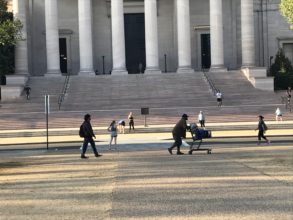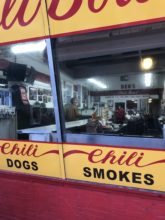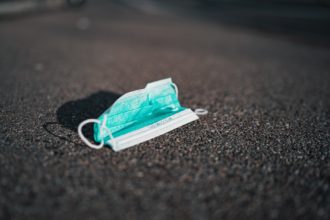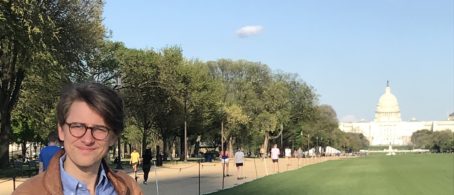Life under lockdown in Washington DC has quickly led to new habits. The daily late-afternoon walk ranks in the category ‘pleasant’. The Corona-crisis has turned parts of DC into what sometimes resembles a Southern European city: countless people just going around the neighbourhood, stopping for a chat. People on the streets instead of cars. This is one aspect that I hope remains after the days of quarantine are over.
 There is of a course a local touch to this leisurely spectacle. Normally one of the most dressed-up cities in the US, DC now seems to wear little else but sports kit and ‘athleisure’ wear. If I were to make a Corona-investment, it would be in companies producing yoga pants. Until then, I try and spend money at local restaurants than are eerily empty now. Ben’s Chili Bowl – in business since 1958 – had a radio add calling on customers to do take out. I happily obliged.
There is of a course a local touch to this leisurely spectacle. Normally one of the most dressed-up cities in the US, DC now seems to wear little else but sports kit and ‘athleisure’ wear. If I were to make a Corona-investment, it would be in companies producing yoga pants. Until then, I try and spend money at local restaurants than are eerily empty now. Ben’s Chili Bowl – in business since 1958 – had a radio add calling on customers to do take out. I happily obliged.

Five o’clock is now competing with other moments of the day for the cocktail hour slot. ‘We have rediscovered daytime drinking’, a neighbour merrily announced. Being a foreign correspondent means 17:00 hours is Trump time. At that moment the White House holds its daily Corona-briefing. Like the daily sitcom, there is always anticipation about who will star today. The President himself of course is the lead character, and vice-president Pence is rarely absent. Around this core duo, there is a revolving cast of characters. Medical experts, military men and the president’s own family, to all of whom Trump grants the stage.
Will Anthony Fauci, the country’s top epidemiologist speak? Or will he only stand there, keeping a plain face, trying to not reveal his inner thoughts as the president of the United States touts unproven drug treatments for Corona and spreads misinformation. ‘We are doing a great job’. ‘We have this under control’. ‘I have great relations with the State governors’.
In the midst of the greatest health crisis the US has seen in a century, Trump deals in false reassurance. The registered death toll is nearing the 15.000 and expected to reach the 100.000 or beyond. New York City is considering mass burial sites in public parks. On Twitter, Trump taunts and insults State governors, who beg the federal government to supply more emergency ventilators and masks. As long as the Corona-crisis lasts, United is the last thing these States are.
On a recent occasion, The Corona-briefing featured Michael J. Lindell. From Minnesota and with an estimated net worth of $300 million, this businessman stood behind the lectern to explain what Americans should do now the virus spreads. The US was a nation ’that had turned its back on God’, Lindell Said. It was time to ‘go home and get back in the Word’.
 The enormous reservoir of religiosity among Americans is, admittedly, one of the things I struggle with most to get my head around. Maybe it’s my personal conviction that faith, or non-belief, is best practiced in private – I consider a church congregation hovering between the public and the private sphere – and preferably not talked about. Lindell reminded me why. ‘God gave us the grace on November 8 2016 to change the course we were on’, he said. I consider politicians elected, not as divine gifts. When faith meets political power, the inexcusable becomes a priori pardoned. Trump has proven a case in point on numerous occasions.
The enormous reservoir of religiosity among Americans is, admittedly, one of the things I struggle with most to get my head around. Maybe it’s my personal conviction that faith, or non-belief, is best practiced in private – I consider a church congregation hovering between the public and the private sphere – and preferably not talked about. Lindell reminded me why. ‘God gave us the grace on November 8 2016 to change the course we were on’, he said. I consider politicians elected, not as divine gifts. When faith meets political power, the inexcusable becomes a priori pardoned. Trump has proven a case in point on numerous occasions.
Lindell is also an ‘inventor’ and the CEO of My Pillow, an online company dealing in, well, pillows. On its website, you can buy his book filled with entrepreneurial wisdom as well as a Mike Lindell bobble-head-figure. Perhaps this effigy will now be in higher demand, as Lindell has converted part of his production capacity to making facemasks. He had been invited by Trump to announce this generous act of supplying the nation in times of need. There was a question begged by this little spectacle of capitalist theocracy that America in a way has become. Why are facemasks, cheap and even less perishable than Twinkies, in such short supply in the US?

The Surgeon General recently reported critical shortages of all medical supplies. US hospitals report having to compete for stock amongst each other, often finding batches snatched away by a higher bidder. The Corona outbreak is considered a global health crisis. At the same time, it is a crisis of completely market-based healthcare systems that promise rewards for those who can turn scarcity into profit.
While writing the paragraph above, the name of one of the main proponents of an alternative health care system, pops up in my mailbox under the header ‘breaking news’. Bernie Sanders is quitting the primaries, making Joe Biden in all likelihood the Democratic nominee. Sanders’ free health care for all plan was one of the reasons many moderate Democrats were reluctant to pit him against Trump. Political history does not deal in ‘ifs’, but one wonders how the primaries would have played out if Corona had hit a few months earlier.
Still, health care persistently ranks as the number one topic of concern for American voters on either side of the political divide. Bernie throwing in the towel was a reminder that a presidential election waits at the end – or maybe in the midst – of this. US financial institutions operate on scenarios that the economy will not return to full normal until the summer of 2021. Events drawing large crowds, for instance, may be banned for a significant period of time. The mass rally is perhaps the most defining feature of US elections, and I was looking forward to reporting on them. Instead, I brace myself for more televised speeches. Not having a fired-up MAGA-crowd may turn out to be Trumps biggest problem that comes out of the Corona-crisis.

Casper Thomas is correspondent in Washington D.C. for Het Financieele Dagblad and editor of De Groene Amsterdammer.